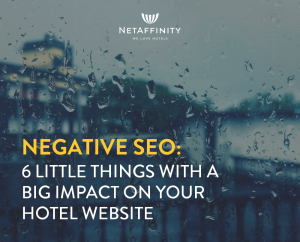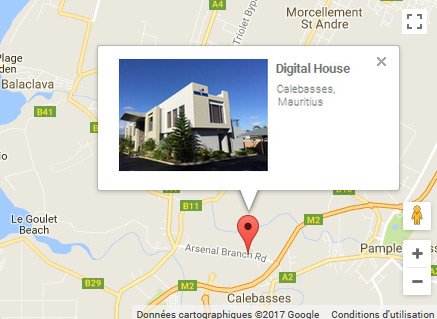Negative SEO is a term usually used to

describe an attack on your website by a competitor to lower your SEO, this can take the shape of spammy links being built to your site, hacking, or content duplication just to name a few common ones.
While it’s important to be aware of the potential external threat, your competitors are not the only secret SEO assassins you should be looking out for. You may be damaging your own SEO and not even know about it!
There are a number of ways to protect yourself from an external or self-inflicted sabotage. Here are 6 things you definitely shouldn’t be doing if you want to avoid a damaging attack or self-sabotage to your hotel’s website.

1. Using the wrong keywords
When doing keyword research, it’s easy to automatically get stuck on the first important keywords that come to mind, but effective keyword use relies on a whole lot more.
Let’s say you’re a hotel just a short 10-minute drive from Dublin Airport. Your first instinct may be to want to appear for keywords like “airport hotel” or “hotel near Dublin airport”. A lot of people search for those, right? They must be what I’m after!
They aren’t, and here is why: they’re too common.
Keywords like these are so in-demand and competitive that your chances of appearing top of the list for them is slim-to-none, especially considering the fact that there are several other hotels that are a lot closer and a lot more qualified to answer to the query at hand. What you should be focused on are the low-hanging fruit. These are the low volume, specific key words and phrases that will bring in users who will actually convert, better known as long-tail keywords.
2. Using too many links
Linking too often to external sites can be quite damaging to your own SEO.
Regardless of whether they link internally or externally, you should avoid putting an excessive amount of links on a single given page.
Search engines will only crawl a certain number of links per page, meaning that some links may be left out if your page is flooded with them. Additionally, every extra link weakens the influence and authority of all the other links on the page.
From a user’s standpoint, excessive linking may also lead to issues accessing or reading the content. Although Google’s penalty is something to really look out for, the real damage comes from the unnatural outbound links making your page look spammy as a consequence.
The more spammy the content, the less trustworthy your website will be listed by the search engines, and the higher your bounce rates will be.
3. Paying for spammy links
This one is all about quality over quantity.
Back in the day, it was common practice to get involved in backlink purchasing, hidden link and link network schemes and link farms to improve SEO.
Nowadays, though, with vast improvements to sapm-909485_640search engine intelligence and the way they rank results, not only do these archaic practices no longer work, but they are also actively and consistently penalised. While you may be tempted to buy links from link farms, or get yourself listed just about everywhere you can, fight the urge.
There is no doubt that backlinks from reputable sources are very valuable to your own authority and ranking. Links from untrustworthy or spam-filled sources, on the other hand, may undo all the good the other sites were contributing.
Although several SEO guides will tell you to look out for competitor sabotage with regards to spammy links, Moz explains, all may not be as it seems.
4. Duplicating pages and content
This is one of the most common ways you or a competitor could cause negative SEO to your site. A competitor can sabotage you by scraping your website’s content and copying it over to other websites, often as part of the previously mentioned “link farms”.
You can sleep soundly, though, in the knowledge that Google’s recent updates to their crawl and ranking methods have included methods to combat this practice. This means that when Google comes across duplicated content on several sites, it only selects one to use in the ranking and results. Usually, this would be you, as it chooses the one indexed first. Keep an eye out for duplication of your content. A tool like Copyscape can easily pick up on duplicated pages and content on external sources.
Competitors aren’t the only ones to watch out for in this respect, you have to ensure you aren’t the culprit behind duplicated content yourself! Make sure that all the content on your website is original and that every page is unique.
You can check for duplicate content on your own site through a tool like SEO Profiler. Here, you can run a full analysis of your site and flag a number of errors and warnings, including duplicate or unoriginal content.
5. Overusing keywords
We previously discussed keywords in depth in our previous installment of our guide to SEO, but keyword overuse is worth mentioning again in more detail here. Excessive keyword usage can be very damaging to your SEO.wordcloud
Stuffing your page full of the same repetitive keywords will upset search engines and be interpreted as spam. Google will not prioritize you. Instead, you’ll be more likely to find yourself faced with a penalty. They will interpret this practice as trying to work around the algorithm, rather than focusing on a good user experience, which is their number one priority.
The rule of thumb here is quality over quantity. Pick the right keywords and use them in the most relevant and appropriate way and you’ll be the winner at the end of the day.
6. Forgetting the Meta Data
Omitting meta data is akin to turning the stove on to the lowest to boil water. Sure, you could still boil water without turning on the stove to full blast, but it’ll be a lot more work than it needs to be.
The meta data for your website is what will drive users from the search engine to your site to make a booking. Search engines need this little bit of behind-the-scenes text to be able to read and understand your content during its crawl.
The meta data is essentially the bit of text that will dictate to the search engine exactly what your webpage and website are all about. Without it, they may have difficulty picking up the key words and phrases, leading to a little search engine confusion and damaged authority.
Whilst meta data won’t make or break your results ranking, it is important to keep in mind that it often dictates your search results appearance and therefore plays a key role in your click-through-rate and trustworthiness.
SEO is daunting, and it may seem like there is a whole lot to watch out for in terms of negative SEO. There is, but there is also a whole lot you can do right. Search engine optimization is a game of chess between you and the search engine providers. Play by the rules and make the right moves, and you’ll win. No need for cheating here!
Source: Original article
 describe an attack on your website by a competitor to lower your SEO, this can take the shape of spammy links being built to your site, hacking, or content duplication just to name a few common ones.
While it’s important to be aware of the potential external threat, your competitors are not the only secret SEO assassins you should be looking out for. You may be damaging your own SEO and not even know about it!
There are a number of ways to protect yourself from an external or self-inflicted sabotage. Here are 6 things you definitely shouldn’t be doing if you want to avoid a damaging attack or self-sabotage to your hotel’s website.
describe an attack on your website by a competitor to lower your SEO, this can take the shape of spammy links being built to your site, hacking, or content duplication just to name a few common ones.
While it’s important to be aware of the potential external threat, your competitors are not the only secret SEO assassins you should be looking out for. You may be damaging your own SEO and not even know about it!
There are a number of ways to protect yourself from an external or self-inflicted sabotage. Here are 6 things you definitely shouldn’t be doing if you want to avoid a damaging attack or self-sabotage to your hotel’s website.
 describe an attack on your website by a competitor to lower your SEO, this can take the shape of spammy links being built to your site, hacking, or content duplication just to name a few common ones.
While it’s important to be aware of the potential external threat, your competitors are not the only secret SEO assassins you should be looking out for. You may be damaging your own SEO and not even know about it!
There are a number of ways to protect yourself from an external or self-inflicted sabotage. Here are 6 things you definitely shouldn’t be doing if you want to avoid a damaging attack or self-sabotage to your hotel’s website.
describe an attack on your website by a competitor to lower your SEO, this can take the shape of spammy links being built to your site, hacking, or content duplication just to name a few common ones.
While it’s important to be aware of the potential external threat, your competitors are not the only secret SEO assassins you should be looking out for. You may be damaging your own SEO and not even know about it!
There are a number of ways to protect yourself from an external or self-inflicted sabotage. Here are 6 things you definitely shouldn’t be doing if you want to avoid a damaging attack or self-sabotage to your hotel’s website.


